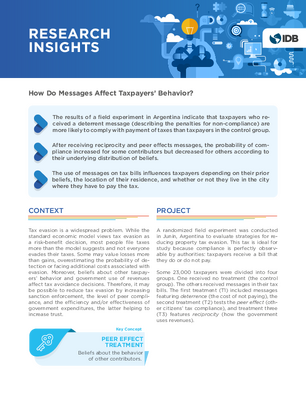Research Insights: How Do Messages Affect Taxpayers’ Behavior?
Date
Aug 2023
Publication
Journal version
The results of a field experiment in Argentina indicate that taxpayers who received a deterrent message (describing the penalties for non-compliance) are more likely to comply with payment of taxes than taxpayers in the control group. After receiving reciprocity and peer effects messages, the probability of compliance increased for some contributors but decreased for others according to their underlying distribution of beliefs. The use of messages on tax bills influences taxpayers depending on their prior beliefs, the location of their residence, and whether or not they live in the city where they have to pay the tax.




